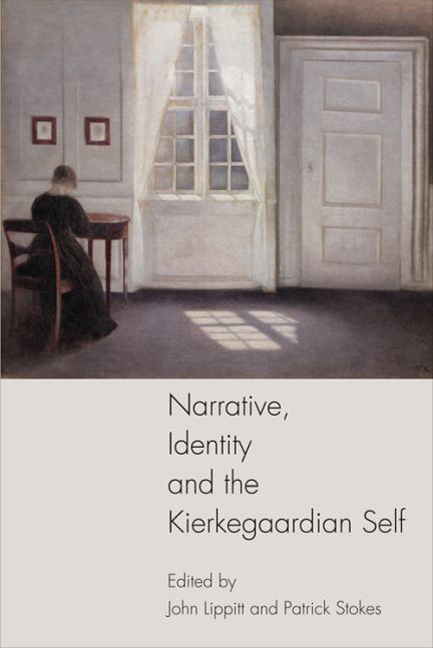Book contents
- Frontmatter
- Contents
- Acknowledgements
- Abbreviations
- Contributors
- Introduction
- 1 The Moments of a Life: On Some Similarities between Life and Literature
- 2 Teleology, Narrative and Death
- 3 Kierkegaard's Platonic Teleology
- 4 Narrative Holism and the Moment
- 5 Kierkegaard's Erotic Reduction and the Problem of Founding the Self
- 6 Narrativity and Normativity
- 7 The End in the Beginning: Eschatology in Kierkegaard's Literary Criticism
- 8 Forgiveness and the Rat Man: Kierkegaard, ‘Narrative Unity’ and ‘Wholeheartedness’ Revisited
- 9 The Virtues of Ambivalence: Wholeheartedness as Existential Telos and the Unwillable Completion of Narravives
- 10 Non-Narrative Protestant Goods: Protestant Ethics and Kierkegaardian Selfhood
- 11 Narrativity, Aspect and Selfhood
- 12 The Senses of an Ending
- 13 The End? Kierkegaard's Death and its Implications for Telling his Story
- Bibliography
- Index
9 - The Virtues of Ambivalence: Wholeheartedness as Existential Telos and the Unwillable Completion of Narravives
Published online by Cambridge University Press: 15 September 2017
- Frontmatter
- Contents
- Acknowledgements
- Abbreviations
- Contributors
- Introduction
- 1 The Moments of a Life: On Some Similarities between Life and Literature
- 2 Teleology, Narrative and Death
- 3 Kierkegaard's Platonic Teleology
- 4 Narrative Holism and the Moment
- 5 Kierkegaard's Erotic Reduction and the Problem of Founding the Self
- 6 Narrativity and Normativity
- 7 The End in the Beginning: Eschatology in Kierkegaard's Literary Criticism
- 8 Forgiveness and the Rat Man: Kierkegaard, ‘Narrative Unity’ and ‘Wholeheartedness’ Revisited
- 9 The Virtues of Ambivalence: Wholeheartedness as Existential Telos and the Unwillable Completion of Narravives
- 10 Non-Narrative Protestant Goods: Protestant Ethics and Kierkegaardian Selfhood
- 11 Narrativity, Aspect and Selfhood
- 12 The Senses of an Ending
- 13 The End? Kierkegaard's Death and its Implications for Telling his Story
- Bibliography
- Index
Summary
NEW QUESTIONS FOR NARRATIVISTS
In recent years, narrative interpretations of selfhood in Kierkegaard's works have provided a fertile basis for approaching a range of issues in moral psychology that are important in their own right. It is interesting how much these debates have started to focus less on Kierkegaard interpretation and more on developing Kierkegaard's insights to make headway on some of the perennial questions of philosophical anthropology. Anthony Rudd and I have defended ‘narrative realist’ accounts of selves that draw on Kierkegaard for inspiration. Likewise, several papers in this volume challenge these narrative theories on their merits, and especially as ways to understand ethical and religious ideals. I cannot do justice to the rich range of new questions raised in these contributions, but I will focus on three in particular. These are Walter Wietzke's suggestion that a rich conception of the human telos rather than narrative form is doing the heavy lifting in recent Kierkegaardian narrativist theories; John Lippitt's argument that forms of ambivalence incompatible with wholeheartedness may be needed both in coming to terms with psychic conflict and in forgiveness; and Eleanor Helms’ claim, supported by Kierkegaard and Kermode, that we can only hope for endings that yield a coherent story – in both artworks and real human lives. I am indebted to all three for these challenging questions about the adequacy of my own conception of practical identities as ‘narravives’, that is, living processes of accumulating meaning-relations with a narrative-like temporal structure that partly precede explicit ‘telling’ or reflective explanation.
In what follows, I will address Lippitt's suggestions first before turning to Wietzke's critique and finally to Helms’ redeployment of the ‘eschatological’ interpretation of existential faith as a paradigm for narratival completion in general. Wietzke's challenge is deepest in its potential dangers for narrativist readings of Kierkegaard (and selfhood in general), because it holds that a controversial conception of our telos is needed to ground the superiority of the ethical life-orientation defended by the Judge in Either-Or II. Thus it implies that the demands of narrative unity do not help explain or justify the telos involved in the ethical stage – which I have characterised as including ‘existential autonomy’ (the type of self-governance needed for responsibility for one's character), but which may also include flourishing or a robust kind of first-personal life-meaning.
- Type
- Chapter
- Information
- Narrative, Identity and the Kierkegaardian Self , pp. 144 - 160Publisher: Edinburgh University PressPrint publication year: 2015



